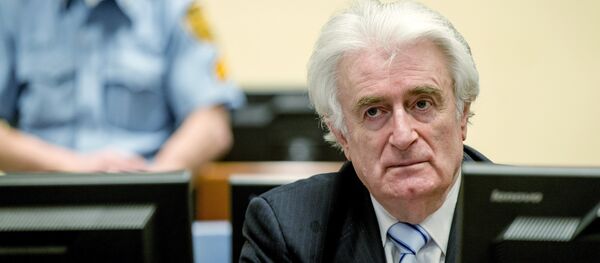By the end of the Bosnian War, Karadzic was placed on trial for charges of genocide and crimes against humanity, becoming a political fugitive. He managed to escape international authorities and evaded capture until his arrest in Belgrade in 2008. Most people know this, but here are seven commonly unknown facts about Karadzic.
2. Karadzic was educated as a professional psychiatrist specialized in neurosis and depression. During 1974-1975, he underwent medical training at Columbia University in New York.
3. Karadzic was an amateur poet influenced by Serbian writer Dobrica Cosic, whose work eventually encouraged Radovan to pursue politics. Interestingly, Karadzic was known to have hated nationalism and once even said:
"Bolshevism is bad, but nationalism is even worse."
4. When prior to the Yugoslav Wars, the socio-political situation between different ethnic groups living in Yugoslavia began to intensify, Karadzic began to envision the idea of uniting ethnic Serbs living within the borders of Yugoslavia. His anti-nationalist rhetoric from the past was quickly gone, as he began saying:
"If need be, Serbs can live without food, but can't survive without their country."
5. Karadzic was the leader of Bosnian Serbs and the 1st President of Republika Srpska, the heavily-populated Serb district in the southeastern part of Bosnia, between April of 1992 and July of 1996. After initial inter-ethnic clashes in Bosnia, Karadzic formed Serbian paramilitary units, inspiring them with one of his motivational speeches:
"We [Bosnian Serbs] never lived in the country of Bosnia, we lived in the Yugoslav republic of Bosnia. Do you feel the difference?"
6. While serving as the president of Republika Srpska, Karadzic worked to build ties with other Orthodox Christian nations, making several trips to Russia and Greece.
7. Karadzic was running from justice using forged documents. He lived in Belgrade for a long time under the name of Dragan Dabic or "Dr. Dabic," an alternative medicine doctor in one of the city's private clinics.
Bosnia in the Yugoslav Wars
In a nutshell, the Yugoslav Wars were a series of ethnic conflicts between the peoples of the Former Yugoslavia, who fought to declare independence and form their own national governments. As a result of the Yugoslav Wars of secession, six new countries — Bosnia and Herzegovina, Croatia, Macedonia, Slovenia, Montenegro and Serbia — emerged in southeastern Europe.
The Bosnian War was fought between Bosniaks [Bosnian Muslim by faith or tradition], Serbs and Croats all living in Bosnia and Herzegovina when the region declared its secession from Yugoslavia in 1992. Essentially, it was a free-for-all conflict between the three sides each seeking their own objective: the Republic of Bosnia and Herzegovina wanted independence, while ethnic Serbs and Croats fought against the Bosnian Army and each other, seeking autonomy from the newly independent country. The self-proclaimed Bosnian Serb and Bosnian Croat paramilitary units operating in Bosnia were supported by Belgrade and Zagreb, respectively.




